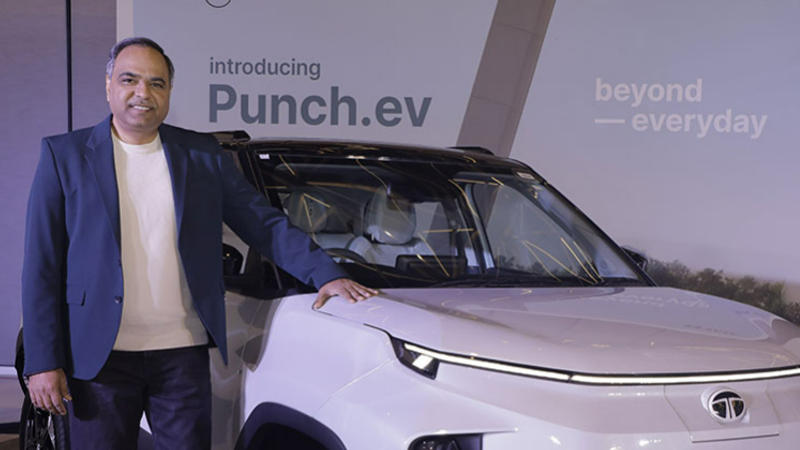Published 19:45 IST, January 22nd 2025
'Competition is Good': Tata Motors' Shailesh Chandra On EVs
According to Chandra, competition fosters innovation, as companies strive to differentiate themselves through technology, design, and performance.

The global transition to electric vehicles (EVs) has ushered in a wave of innovation, competition, and collaboration in the automobile industry. In India, the Battery Electric Vehicle (BEV) market is witnessing sutained growth with Tata Motors leading the charge. Shailesh Chandra, Managing Director of Tata Motors Passenger Vehicles and Tata Passenger Electric Mobility, believes that competition in the EV space is not just inevitable but beneficial for the industry as a whole.
Encouraging Market Expansion
In a recent round table interaction with reporters, Chandra emphasized that competition in the EV market is a critical enabler for growth. He explained that new entrants and rival automakers like Maruti Suzuki , Hyundai Motor India, etc., will help expand the market by increasing consumer awareness, developing infrastructure, and driving down costs through economies of scale.
“ This competition had to come earlier. It has come a bit late. But possibly it is also coming at a time where the EV prices are coming closer to the ICE (Internal Combustion Engine) prices primarily because battery cell prices which has significant reduced by 50-60 percent. The competition is good (for us) as it is going to expand the market further, ” said Chandra at the Bharat Global Mobility Expo 2025.
Driving Innovation and Sustainability
According to Chandra, competition fosters innovation, as companies strive to differentiate themselves through technology, design, and performance. He also stated that Tata Motors has been investing heavily in R&D to improve battery efficiency, enhance vehicle performance, and reduce costs.
“Why I think the EV market will expand is because Evs were under a lot of stress over the last few years. Globally, EVs were spoken in a negative way (and were) potrayed in a glooom and doom scenario. People were thinking if they would consider buying Electric Vehicles (EVs). When all the manufacturers come in, it will give the impression that this is the technology of the future and is not backed by one manufacturer,” added Chandra.
Collaboration for Ecosystem Development
While competition is essential, Chandra highlighted the need for collaboration among stakeholders to develop the EV ecosystem. This includes building charging infrastructure, creating policies that support EV adoption, and ensuring a steady supply chain for critical components like batteries.
“It will give a lot of confidence to those entrepreneurs working on the ecosystem side because all the manufacturers are now coming in. So I believe that the growth should be now tremendous. If it is not, then there is problem for everyone,” Chandra further added.
Tata Motors’ Leadership in EVs
Tata Motors has been a pioneer in the Indian EV market, with its models like the Nexon EV, Tiago EV, Tata Punch EV gaining significant traction. The company believes it has taken a significant leap in its electric vehicle (EV) journey by unveiling the much-anticipated Harrier EV, a fully electric version of its popular mid-size Sports Utility vehicle (SUV).
Responding to a query on Maruti Suzuki aiming to be a market leader in Electric passenger Vehicle segment, Chandra maintained, “Which company doesn't want to be number one? We will take our set of actions. The other companies will take their set of actions. There are reasons why we believe that we can be number one. But the jury is out. Let's see. Ultimately, the numbers will only tell.”
Dual platform strategy
When asked if the company is working on Ground-up EV platforms like Mahindra and Mahindra, Chandra said it will be adopting a dual platform strategy for both ICEVs and EVs.
“Unfortunately, we always confuse a new tophat (of a car) with a pure EV as the born Electric Vehicle. While we have our pure EV architecture while keeping the same tophat. We we have to really understand what born EV is, asserted Chandra.
The Road Ahead
Chandra anticipates that EV penetration in the country could reach 15-20 percent by 2030. . Chandra is optimistic about the future, predicting that competition will lead to better products and services for consumers.
“I believe that by 2030 should see about 15 -20 percent (EV) penetration. About one year back also, when we were presenting in our investor conference, we had said that we believe it would be somewhere around 15 -20 percent penetration. And we would be targeting about 30 percent+ (out of our sales).”
Updated 19:53 IST, January 22nd 2025